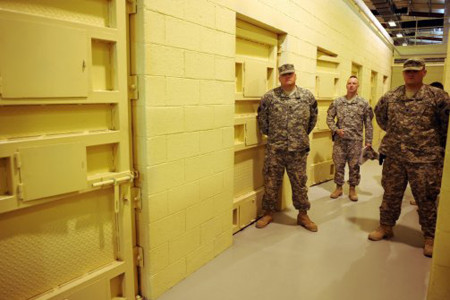By Aram Roston
Guantanamo Bay is still often in the public eye, especially now that a military commission is pursuing the 9/11 case there against alleged terrorist mastermind Khalid Sheikh Mohammed. But there’s a site where the United States is holding detainees overseas in even more restrictive conditions then Guantanamo: a prison in Afghanistan, at the sprawling Bagram Air Base. Recently, the U.S. government agreed to transfer Afghan prisoners into the custody of the Afghan government. But there was a wrinkle: People who aren’t Afghans—who were taken to Bagram by the United States from outside the country—aren’t included in the agreement.
Today, Justice Department lawyers head to federal court to argue that these international detainees should not get the right to see lawyers or challenge the basis for their captivity under the doctrine of habeas corpus. The case concerns three captives at Bagram captured early on in the war on terror. Two are Yemeni and one is Tunisian. One was captured in Thailand; another was captured in Pakistan. (The question of where the third was captured is somewhat unclear: The Pentagon says he was captured in Afghanistan, but lawyers who seek to represent him say he was captured outside the country.)
“The only reason our clients are there,” said Tina Foster, a lawyer in the case and executive director of the International Justice Network, “is that that they were forcibly taken there from third countries by the U.S.” She added, “We would argue that they were brought to Bagram for the purpose of keeping them out of the courts.”
So far the U.S. government has never indicated publicly why it has held the men for as much as ten years. One of the Yemenis is Amin Al Bakri, now 44 years old. Captured in Thailand in 2002 and flown to Bagram, according to court records, he has never been allowed to meet with a lawyer. “We don’t know why he is being held,” his brother, Khaled Al Bakri, told me by phone from Medina, Saudi Arabia, where he runs a furniture shop.

US soldiers stand guard beside prison cells during a media tour of Bagram prison, north of Kabul, on November 15, 2009. A human rights group is calling on the United States to develop a new detention policy with Kabul for a US military prison in Afghanistan dubbed the "Afghan Guantanamo." The detention center located at Bagram Air Base north of Kabul holds some 600 detainees captured by US forces in Afghanistan. (Massoud Hossaini/Getty Images)
He claims his brother, who has three children he hasn’t seen since he was taken into custody, wasn’t a religious fanatic pursuing jihad but a businessman. He acknowledges that in the 1980s his brother did go to Afghanistan to combat the Soviets. But he also says that “his Islam is very moderate. My brother is multilingual, he’s open-minded to others and he’s tolerant. We just don’t think he was involved.”
In legal papers, Amin Al Bakri’s attorneys claim that he is not an enemy combatant, and is not affiliated with the Taliban or Al Qaeda. They claim that he was “in Yemen on September 11, 2001, watching in shock with his father as the horror unfolded on television.”
Of course, it is no surprise that a detainee’s family member would profess a prisoner’s innocence. But since there are no public charges against the men, there’s nothing to even refute. Lieutenant Colonel Todd Breasseale, a Pentagon spokesman, declined to discuss specific prisoners at Bagram, but told me that “Bagram happens to be a legitimate and established military detention facility.” “That’s what works for now,” he said. “That is our short term goal, to maintain custody of third country nationals,” even as Afghanistan’s government takes over the Afghan prisoners. Alluding to one of the central conundrums of the ongoing fight against Al Qaeda—where to put potential detainees—he said, “Sending a detainee to Guantanamo Bay is not an option.” President Obama had promised to close Guantanamo Bay, and although that’s not happening, he certainly isn’t authorizing new arrivals.
At the National Security Council, a spokeswoman declined to answer questions and referred calls back to the Pentagon.
Human rights activists see Bagram as a legal black hole. “The administration puts forward the argument that it is their belief that these people should not have the right to go to court,” said Andrea Prasow of Human Rights Watch. “And that’s what’s troubling. As the U.S. prepares to withdraw its troops and wind down the war in Afghanistan, what possible rationale is there for continuing to detain these people there unless its purpose is that it is supposed to be the U.S. global jail?”
Today’s hearing is just the latest chapter in the battle over the legal rights of these detainees. In 2009, federal Judge John D. Bates ruled that “Aside from where they are held, Bagram detainees are no different from Guantanamo detainees,” who have the right to meet their lawyer and file for habeas corpus. An appellate court overruled him in 2010, on the grounds that federal courts had no jurisdiction at Bagram, but left open enough wiggle room for the detainees to file a new petition.



